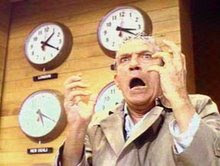There is a economic furphy that we must have full employment, that is, the unemployment rate must be kept low. Underlying this statement are one assumption which I think needs to be carefully looked at.
Assumption: You are only contributing to society if you are in a paid job.
This is a crock of shtimpy. In fact I think that there are people who contribute far more to society by staying at home then some out there who are earning money. I would even put forward the idea that if more people did stay at home, the world would be a better place. One reason that everyone has to work in a job that pays money is due to the financial pressures put upon them by ideologies of certain governments. The conservative mantra is that money is the determinant of not just your material wealth, but your social wealth as well. So it looks down upon those that stay at home and "not work". Because of course when you are at home you don't do any work, just ask any stay at home mum or dad. If more people stayed at home, the impact that may arise from such things as the possible collapse of the ABC child centres would not be so great.
By taking this further, we get the situation that by having less people "working" the unemployment rate would be lower!
On a side issue, there are the misleading terms "earn" and "make" when it comes to describing your wage. This article has an interesting idea that we should replace these terms with 'receive'. Does an executive of a paper-clip company really 'earn', say, $300,000? Do they contribute to society in a way that is 6 times that of a rubbish removalist on a wage of $50,000? Which one would disrupt society more if they stopped doing their job? Who is more valuable to a functioning society?
Subscribe to:
Post Comments (Atom)

No comments:
Post a Comment